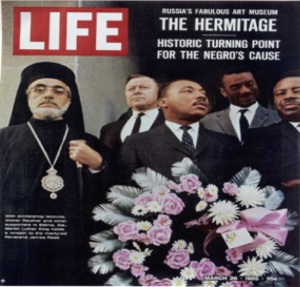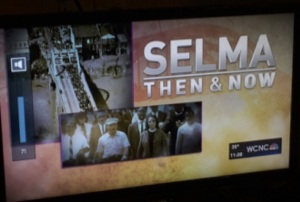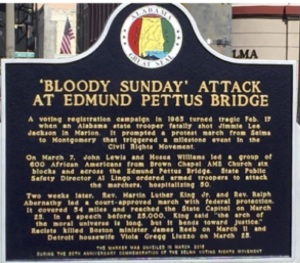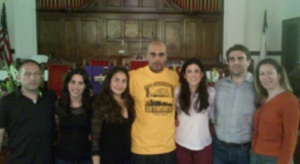Posted in Category One
ON THE ROAD TO SELMA
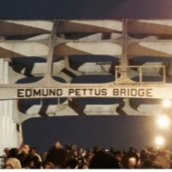
On March 6, 2015, a delegation of the Saint Andrew’s Freedom Forum traveled from New York City and Washington, DC to Selma, Alabama to commemorate the 50th Anniversary of the March on Selma. The March on Selma catalyzed the passage of the 1965 Voting Rights Act, which enabled the broader – and fairer – participation of African-Americans in our nation’s democratic experience. The decision of Archbishop Iakovos to join Dr. Martin Luther King Jr., in the March on Selma also proved a seminal moment for Hellenism and the Orthodox Christian community in the United States. For a description of the circumstances surrounding Archbishop Iakovos’ trip to Selma, read Sometimes The World Is Black and White, by Dr. Alexandros K. Kyrou, Professor of History at Salem State University.
When Archbishop Iakovos marched in Selma, he was not only serving as the leader of the Greek Orthodox Church of North and South America, but also as one of the presidents of the World Council of Churches and the Vice-President of the National Council of Churches. In Selma, Archbishop Iakovos joined Dr. King at Brown Chapel AME in eulogizing Reverend James Reeb, the Unitarian Universalist minister from Boston who was killed by the Klu Klux Klan for answering Dr. King’s call to come to Selma. After the eulogy service, Dr. King and Archbishop Iakovos marched with 4000 civil rights activists to the Selma Courthouse demanding justice. In front of the locked building, Dr. King and Archbishop Iakovos were captured in a photograph that appeared on the cover of the March 26, 1965 edition of Life Magazine. By traveling to Selma, Archbishop Iakovos overrode his advisors. Click here to see the video of Archbishop Iakovos reflecting on the March on Selma.
Screen shot WCNC interview
We drove to Selma because we wanted to honor the memory of Rev. Reeb, Dr. King, Archbishop Iakovos and the countless activists who risked life and liberty to challenge injustice. Our presence was also meant to raise awareness of the role that Hellenism and Orthodoxy played in the Civil Rights Movement and bring attention to the many challenges modern society faces including social inequality and poverty. En route to Selma, we were hosted in Charlotte, North Carolina at the historic Open Kitchen Restaurant by proprietors Christina, Lena and Stephanos Skiouris, where we were joined by members of the local community and were interviewed by Ben Thompson WCNC News who aired our “drive to Selma” on local television and brought attention to the relationship between Hellenism, Orthodoxy and the Civil Rights Movement.
In Selma, we joined with tens-of-thousands of people celebrating the civil rights activists who had challenged America’s pernicious history of racial inequality. While we were moved by history when crossing the Edmund Pettus Bridge, visiting Browns Chapel AME and the beauty of the Alabama river and the rustic countryside, there was no escaping the fact that after the politicians and celebrants decamped for home, Selma would continue on as one of the poorest communities in America.
Since the passage of the Voting Rights Act, there have been tremendous strides in race relations that give credence to America’s promise of an ever more perfect union. Yet, endemic poverty in many of America’s marginalized communities undermines our nation’s social fabric. From Ferguson, Missouri and more recently in Baltimore, Maryland, we are witnessing the ills of an endemic poverty that breeds social inequality and violent civil unrest. In 1965, Dr. King and Archbishop Iakovos stood their ground opposing the division of humanity that had come about because of differences in color, wealth and ignorance. Dr. King and Archbishop Iakovos were not too tired or too preoccupied with their daily lives so as to turn a blind eye to the social injustices of their time.
In the midst of the rioting that followed the death of Freddie Gray while in police custody, Baltimore Orioles Executive Vice President John Angelos, expressed the sentiments of many saying that:
… the principle of peaceful, non-violent protest and the observance of the rule of law is of utmost importance in any society. MLK, Gandhi, Mandela, and all great opposition leaders throughout history have always preached this precept…. That said, my greater source of personal concern, outrage and sympathy beyond this particular case is focused neither upon one night’s property damage nor upon the acts, but is focused rather upon the past four-decade period during which an American political elite have shipped middle class and working class jobs away from Baltimore and cities and towns around the U.S. to third-world dictatorships like China and others, plunged tens of millions of good hard-working Americans into economic devastation, and then followed that action around the nation by diminishing every American’s civil rights protections in order to control an unfairly impoverished population living under an ever-declining standard of living and suffering at the butt end of an ever-more militarized and aggressive surveillance state.
Delegation at Brown Chapel AME Church
Mr. Angelos’ statement may be the subject of debate, but he makes one incontrovertible point, that the absence of employment and investment in America’s impoverished communities undermines social justice. Dignity and quality of life are made possible by well paying jobs. It should shock all Americans that the average life expectancy in marginalized communities is lower than those living under the brutal North Korean dictatorship. Equally true is the fact that those living in Baltimore’s wealthiest neighborhoods have an average life expectancy as high as the longest living people on Earth.
If we are to overcome the challenges of our time, we must stare poverty in the face, roll up our sleeves and commit ourselves to investing in America’s marginalized communities, where both infrastructure and social investment lag far behind our national standards, and in many cases, behind the standards of countries the United Nations classifies as least developed nations. We should all take stock of the selfless acts of Dr. King and Archbishop Iakovos and look to our shared humanity as the resource for overcoming today’s social injustice wrought by endemic poverty.
Andreas Akaras, President Saint Andrew’s Freedom Forum

